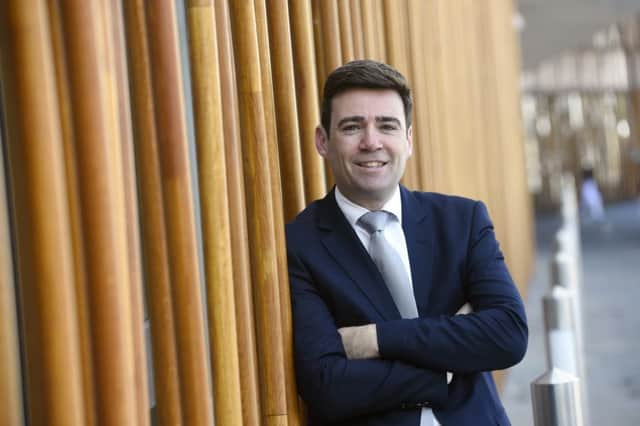Andrew Whitaker: Burnham’s resemblance to Wilson


Tony Blair has had more favourable media coverage in the past few weeks than he has probably had for years, with the former prime minister name-checked left, right and centre in the aftermath of Labour’s election defeat.
After a devastating and unexpected result for Labour it was inevitable that the politician who led the party to three successive election victories, and hammered the Tories, would be viewed in a more sympathetic light, despite the ongoing damage to his reputation caused by the Iraq war.
Advertisement
Hide AdAdvertisement
Hide AdHowever, Harold Wilson, who actually won four times for Labour in the 1960s and 1970s and presided over some of the UK’s biggest postwar reforms, is barely mentioned.
What’s gone unnoticed about Andy Burnham, the current front-runner in a very open contest for the Labour leadership, are what appear to be the striking similarities between the type of political animal he is and Wilson was.
It is too early to say whether Burnham will enjoy the electoral success Wilson enjoyed or even be elected to lead his party, but there’s a clear resemblance in the folksy political style of the two.
Should Burnham win a tight Labour leadership contest, he would be the first leader of the party to hail from the north of England since Wilson held the post from 1963 to 1976.
Labour’s last leader, Ed Miliband, was from London, Gordon Brown, Tony Blair and John Smith all came from Scotland, Neil Kinnock from Wales, while Michael Foot was from Devon and James Callaghan from Portsmouth.
Wilson like Burnham was elected as MP for a constituency in north-west England, Leigh in Burnham’s case in 2001 and Huyton in Wilson’s.
Wilson styled himself a “professional northerner”, adopting an image that saw him associated with HP Sauce. The late politician publicly talked about his fondness for the condiment so much it became known as “Wilson’s gravy” in the 1960s and 1970s.
There were also appearances on the iconic Morecambe & Wise Show during the era, when comic Ernie Wise jokingly used to address Wilson as “Your Majesty”.
Advertisement
Hide AdAdvertisement
Hide AdOne of the things that defines Burnham is his genuinely fanatical support for Everton Football Club – something he makes a great play of in the same way that Wilson did with his home football club, Huddersfield Town.
What’s clear about the political approach of Burnham and that of Wilson is the way both men seemed to travel so light within their party and be content to blow with the prevailing wind.
Burnham, before Jeremy Corbyn’s entry into the contest, was the self-styled candidate of the Left, although it’s not too long ago that he had a reputation as a politician from the Blairite wing of the party.
As a minister of state for health under Blair, Burnham presided over the controversial private finance initiative – a policy that handed often lucrative contracts for the NHS over to private companies.
However, at the fag-end of Gordon Brown’s time in power Burnham began to soften his position, perhaps with one eye on the leadership election that he was to fight unsuccessfully in 2010, finishing a poor fourth behind Ed and David Miliband as well as Ed Balls.
Wilson entered parliament – as would Burnham 50 years later – in a Labour landslide, serving in Clement Attlee’s postwar government that introduced the National Health Service and the Welfare State.
Despite initially been viewed as a centralist MP in Labour terms, Wilson joined Aneurin Bevan, the founder of the NHS, in resigning from the Cabinet in protest at the imposition of prescription charges by the Chancellor of the day, Hugh Gaitskell.
Wilson would, like Burnham decades later, launch a failed leadership bid soon after what was Labour’s third defeat in a row at the 1959 election, when he unsuccessfully attempted to oust Gaitskell, by then party leader.
Advertisement
Hide AdAdvertisement
Hide AdHowever, in 1963, following Hugh Gaitskell’s sudden death, Wilson was elected leader after pitching himself as a left-wing candidate in a contest against his more centrist rivals James Callaghan and George Brown.
Of course, Wilson would go on to win four times for Labour in 1964, 1966 and twice in 1974, and presided over some of the most significant reforms in postwar Britain, such as the abolition of capital punishment, the equal pay act, the decriminalisation of homosexuality and the creation of the Open University.
Yet Wilson was largely a machine politician who was prepared to shift his position if it enabled him to cling on to power.
In fact even Wilson’s image of the Gannex-coated pipe-smoking Labour prime minister is challenged by some.
The late historian Ben Pimlott in his masterly biography of Wilson, written more than 20 years ago shortly before the death of the former prime minister, suggested that Wilson pretended to be a pipe smoker to prevent him gesticulating with his hands while speaking in public.
It’s too early in his career to say whether Burnham will be remembered, like Wilson, as a politician who ended up being distrusted by all wings of Labour due to his ever-changing political stances.
But last week Burnham appeared to shift his position once again, hinting he could back tougher immigration controls in Europe, stating: “I do think Europe has to have a proper look at free movement within Europe and external immigration into Europe.”
For now, though, Burnham remains the favourite, but with shadow home secretary Yvette Cooper starting to perform more brightly and the Blairite orientated Liz Kendall outperforming Burnham in a recent televised debate, it’s by no means certain he will be one of Wilson’s successors.
Advertisement
Hide AdAdvertisement
Hide AdShould he win, however, Burnham must reflect on how Wilson won four elections and how he would go about taking back the 50 or 60 Westminster seats Labour needs to take off the Tories at the 2020 election, if it is to be the biggest party.